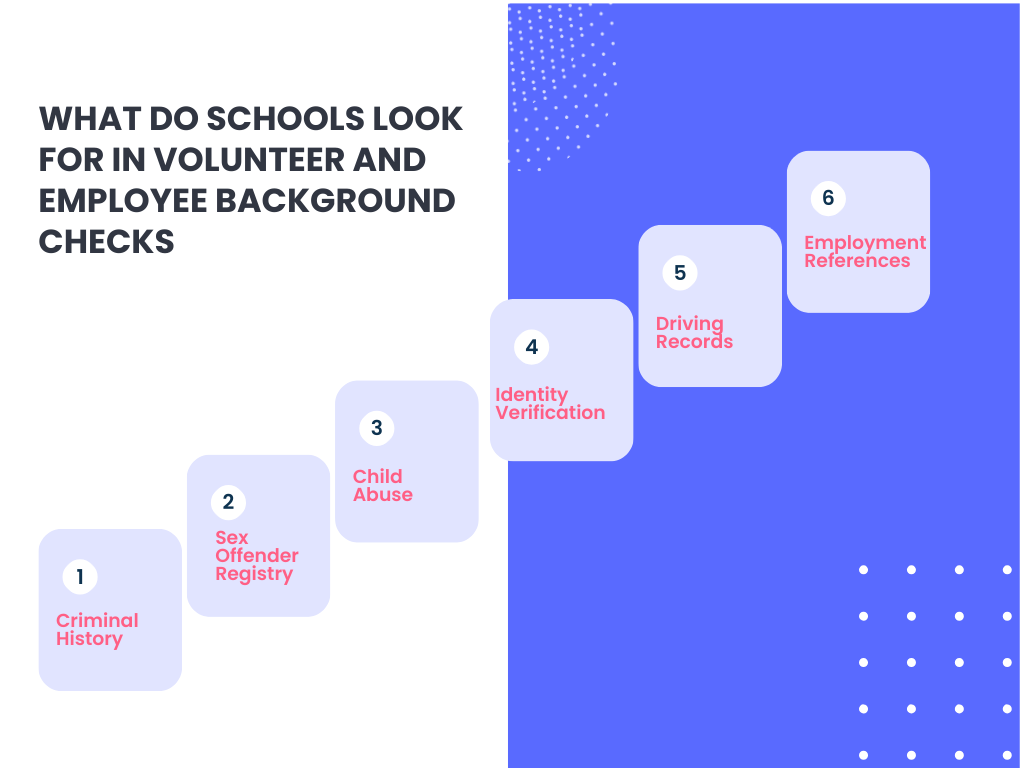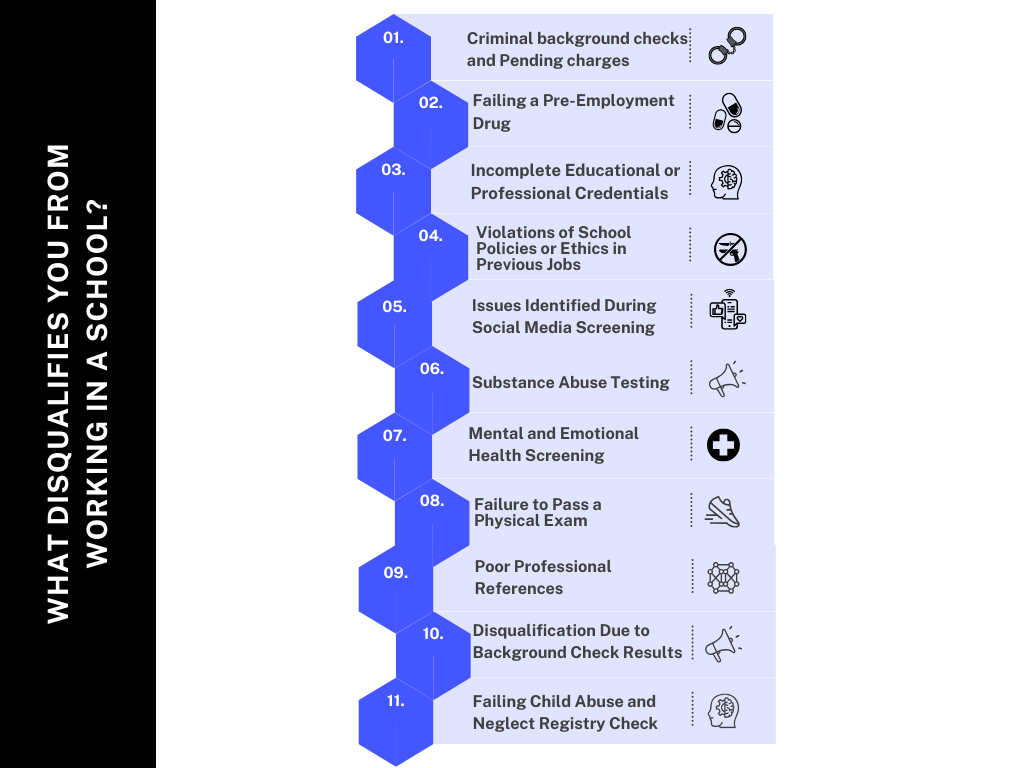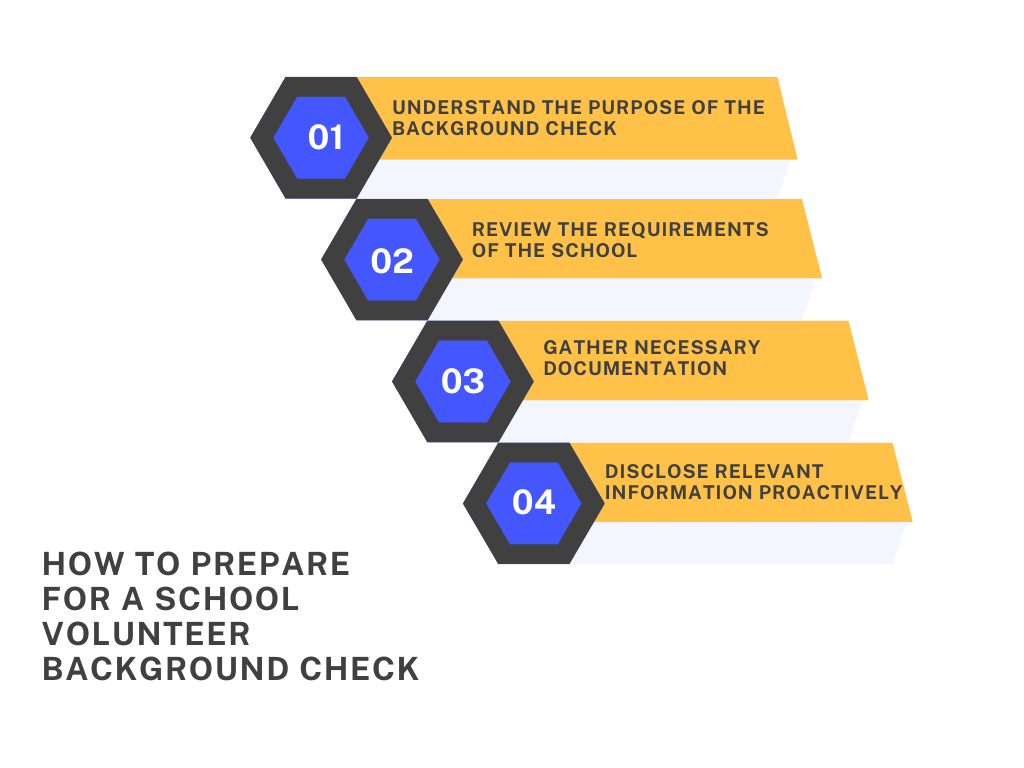What Do Schools Look for in Volunteer and Employee Background Checks?

Schools often search for a history of violence, sexual abuse, child abuse, or neglect—though other crimes, such as drug offenses, may also raise concerns to reduce hiring bias and ensure students' safety. Ensuring the safety of students and maintaining a secure learning environment are top priorities for educational institutions. This involves conducting thorough background checks for employees and volunteers to identify any potential risks.
Educational institutions often utilize screening tools to minimize risks and make informed hiring decisions. This article will explore what schools typically examine in background checks, why these checks are essential for school safety, and how technology is reshaping this process.
What Is a School Background Check?
A school background check is a type of background check that involves examining various records to assess whether an individual is suitable to work or volunteer in an educational setting.
Many states screen teaching applicants for records of child abuse or neglect. A background check reveals convictions for offenses involving children, the ages of the children, and the associated sentences. These checks help schools identify candidates who may pose a threat to student safety.
Criminal history searches—whether at the county, state, or federal level—form the foundation of most employee and teacher background checks. Schools prioritize identifying histories of violence, sexual abuse, child abuse, or neglect, along with other crimes like drug offenses.
Additionally, schools may investigate identity verification, employment history, and personal references to ensure a candidate’s suitability.
What Do Schools Look for in Volunteer and Employee Background Checks?

Schools conduct detailed investigations to ensure applicants meet the necessary standards for interacting with students. Below are key aspects they examine:
- Criminal History: Schools review past convictions to determine if an applicant has been involved in any activities that could endanger students.
- Sex Offender Registry: Schools check national and state-level registries to ensure applicants are not registered offenders.
- Child Abuse and Neglect Records: Authorities verify whether applicants have any records of abuse or neglect involving minors.
- Identity Verification: This step confirms that an individual is who they claim to be, ensuring no fraudulent identities are used during hiring.
- Driving Records: For roles involving student transportation, schools examine driving histories.
- Employment and Personal References: Schools contact previous employers and references to gain insights into an applicant’s behavior and reliability.
Additionally, statistics indicate that 70% of job applicants have lied or would consider lying on their resumes, further emphasizing the importance of thorough background checks for school employees and volunteers.
The Importance of Background Checks for School Safety
Student Safety: Teachers and staff members significantly influence students. Background checks ensure that staff do not have a history of abusive behavior, protecting student welfare.
Background checks also help schools maintain compliance with regulations and demonstrate a commitment to creating a safe learning environment. A background check verifies an individual's identity and past records, including education, employment history, and criminal records, or any other red flags detected in the background check.
Factors That May Lead to Disqualification

Schools consider a range of factors when deciding whether to hire an applicant. Common disqualifiers include:
- Criminal History: A record of violent crimes, theft, or other offenses can indicate risk and disqualify a candidate.
- Registration on a Sex Offender Registry: Schools prioritize student safety, and individuals listed on the registry are automatically disqualified.
- Child Abuse or Neglect Records: A history of harming or neglecting children is a critical concern for educational institutions.
- Social Media Background Screening: Inappropriate or harmful online activity, such as discriminatory or threatening posts, can raise red flags during a social media background check.
- Pending Charges: Schools may hesitate to hire applicants with unresolved legal issues that could indicate future risks.
- Drug or Alcohol-Related Offenses: A history of substance abuse offenses can impact a candidate’s ability to work in a school environment.
Privacy and Fairness in Background Checks for Schools
Educational employers conducting background checks must adhere to legal requirements to ensure the process is both fair and transparent. Key regulations and initiatives include:
- Fair Credit Reporting Act (FCRA): The FCRA mandates that employers inform candidates when a background check is being conducted and obtain their written consent. Additionally, applicants have the right to dispute inaccuracies in the report.
- Fair Chance to Compete for Jobs Act: This law seeks to reduce discrimination by preventing employers from inquiring about criminal history until later stages of the hiring process. This gives candidates with past convictions an opportunity to present their qualifications first.
- Federal Trade Commission (FTC) Guidelines: The FTC ensures that applicants’ rights are upheld during background checks. It emphasizes that employers must follow the law, particularly when using third-party screening services.
Additionally, schools must strike a balance between protecting student safety and respecting applicants' privacy. Employers should avoid using irrelevant or outdated information that could unfairly disqualify candidates.
To enhance fairness, educational institutions are encouraged to adopt clear policies for assessing disqualifications and to provide candidates with opportunities to explain discrepancies or address concerns. This approach helps ensure that decisions are made equitably, minimizing bias in the hiring process.
How to Prepare for a School Volunteer Background Check

Preparing for a school volunteer background check is essential to ensure a smooth and successful application process. Follow these steps to meet requirements effectively:
- Understand the Purpose of the Background Check
Familiarize yourself with why the background check is being conducted. Schools prioritize student safety and want to ensure volunteers do not have a history of behavior that could pose risks. - Review the Requirements of the School
Each school may have specific requirements, such as forms to complete, fees to pay, or identification documents to submit. Check the school’s guidelines to ensure you meet all prerequisites. - Gather Necessary Documentation
Collect documents like your driver’s license, Social Security number, and proof of residence. If applicable, prepare records that verify your employment history, certifications, or prior volunteer experience. - Disclose Relevant Information Proactively
If you have a criminal record or other potential concerns, be honest and upfront about it. Many schools appreciate transparency and may consider the context of past incidents.
By understanding the process and being well-prepared, you can demonstrate your commitment to student safety and increase your chances of approval as a school volunteer.
The Role of Technology in Background Checks
Artificial Intelligence (AI) and Machine Learning (ML) have transformed background checks by automating data analysis, minimizing human error, and enhancing report accuracy.
Ferretly leverage AI-driven solutions to streamline the background check process, providing schools with the ability to assess candidates quickly. AI can scan large databases, including criminal records, employment histories, and even social media activity, to generate a comprehensive profile of a candidate.
Explore how AI can enhance your hiring process with Ferretly Background check with AI.
If you are interested in adopting advanced screening technologies, Request a Demo to learn more about their cutting-edge solutions tailored for schools and educational institutions.
How Far Back Does a School Background Check Go?
The timeline covered by a school background check typically depends on state regulations and the policies of the institution conducting the screening. In general, most background checks review criminal and court records from the past seven years, as this is the standard reporting limit under the Fair Credit Reporting Act (FCRA) for many types of checks.
However, there are exceptions to this general rule:
- Federal Records: Federal offenses may not have a reporting limit and can be reviewed indefinitely.
- Positions Involving Children: For roles requiring direct interaction with children, such as teaching or volunteering, some states allow background checks to extend beyond seven years to ensure thorough vetting.
- Serious Offenses: Convictions for serious crimes, such as violent felonies or sexual offenses, may appear regardless of when they occurred, as they are often not subject to time limitations.
Educational institutions may also require checks to cover an applicant’s complete work and education history, ensuring there are no unexplained gaps or inconsistencies.
For schools, the priority is to maintain a safe and secure environment, and the duration of background checks reflects this responsibility. Institutions often tailor the depth and scope of their investigations based on the sensitivity of the position being filled and applicable legal guidelines.
For a deeper understanding of comprehensive screening processes, explore how a Background check with AI can optimize the safety and efficiency of hiring practices.
How Long Does a College Background Check Take?
The duration of a college background check depends on the type of information required. While some checks are completed within a few days, others may take weeks, especially if they involve multiple levels of verification.
It may take 3–5 business days for basic screenings, while more in-depth checks may require up to 2–3 weeks. The timeline depends on factors like criminal record searches, employment and education verification, and social media reviews. Comprehensive checks involving multiple levels of verification or pending legal matters may take longer.
To expedite the process while ensuring accuracy, institutions can utilize AI-driven solutions like Ferretly—Request a Demo to learn more.
Frequently Asked Questions
1. Advantages of student background checks?
Student background checks provide schools with insights into their character and behavior analysis, ensuring they meet the institution’s standards.
2. Do universities do background checks?
Yes, universities conduct background checks, though this does not necessarily mean applicants will be disqualified.
3. How do colleges verify volunteer hours?
Colleges often request official documentation from organizations or supervisors to verify the authenticity of reported volunteer hours.
4. Does a school district perform background checks?
Schools often conduct one-time criminal history checks, but additional crimes committed during employment may go undetected.
Conclusion: Why Schools Should Prioritize Comprehensive Background Checks
Schools play a critical role in shaping future generations, making it essential to hire individuals who contribute positively to this mission. By implementing robust background screening processes, schools can ensure a safe and secure environment for students and staff alike.
To learn more, visit the educational sector and explore how background checks can reduce hiring bias.






